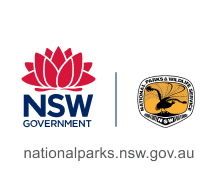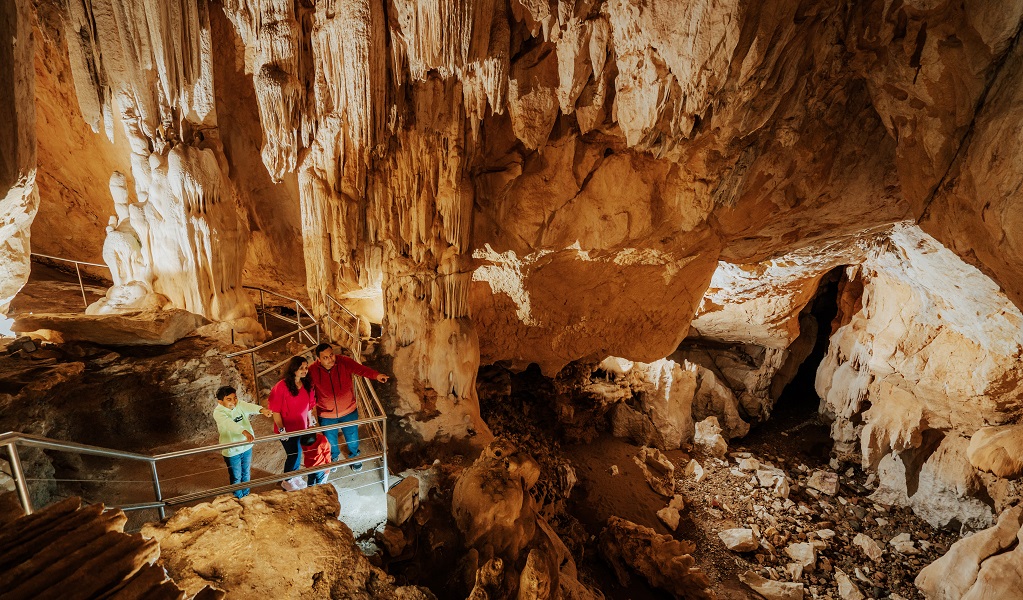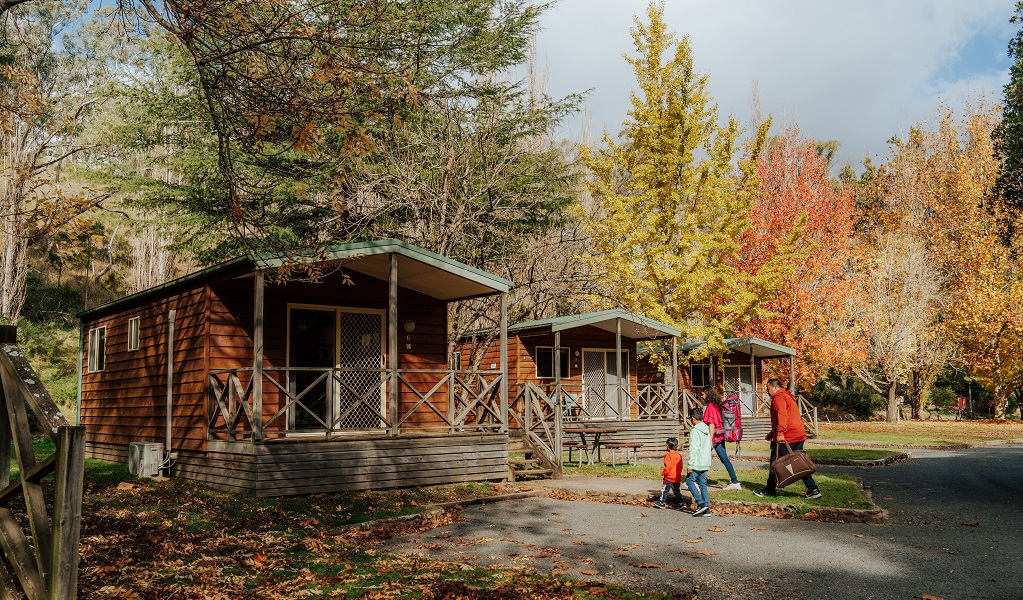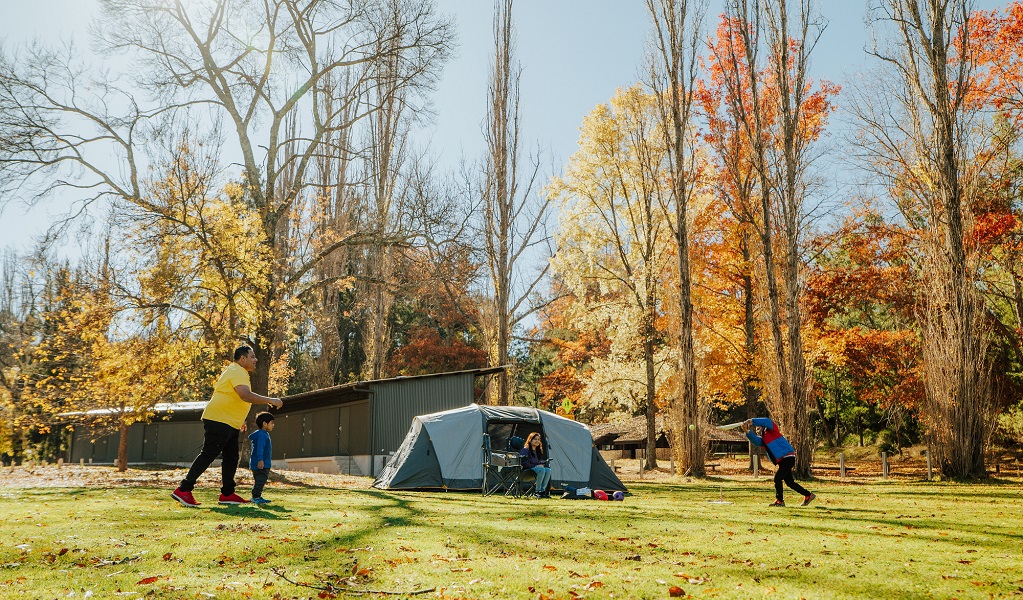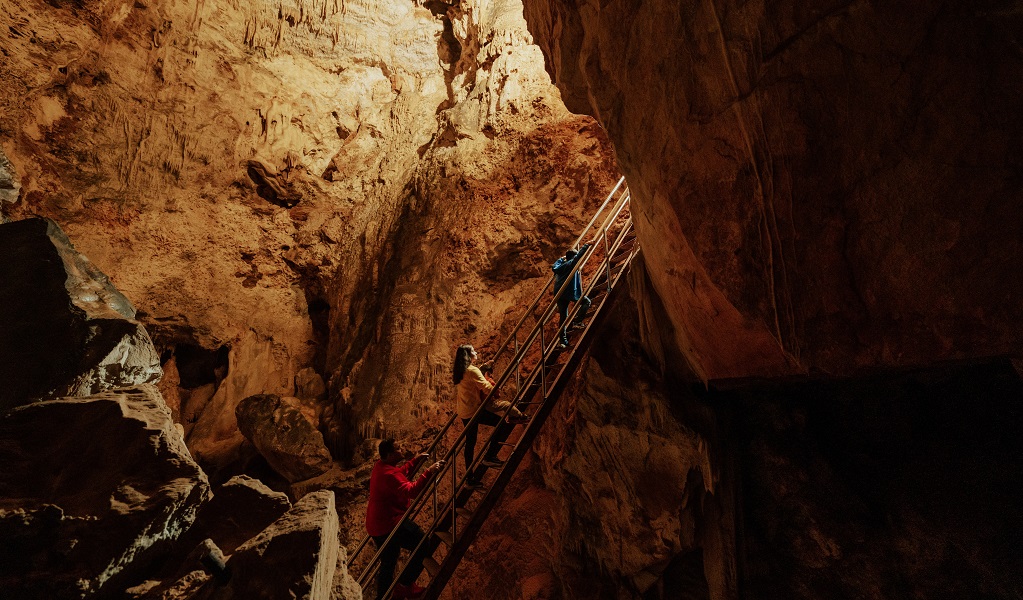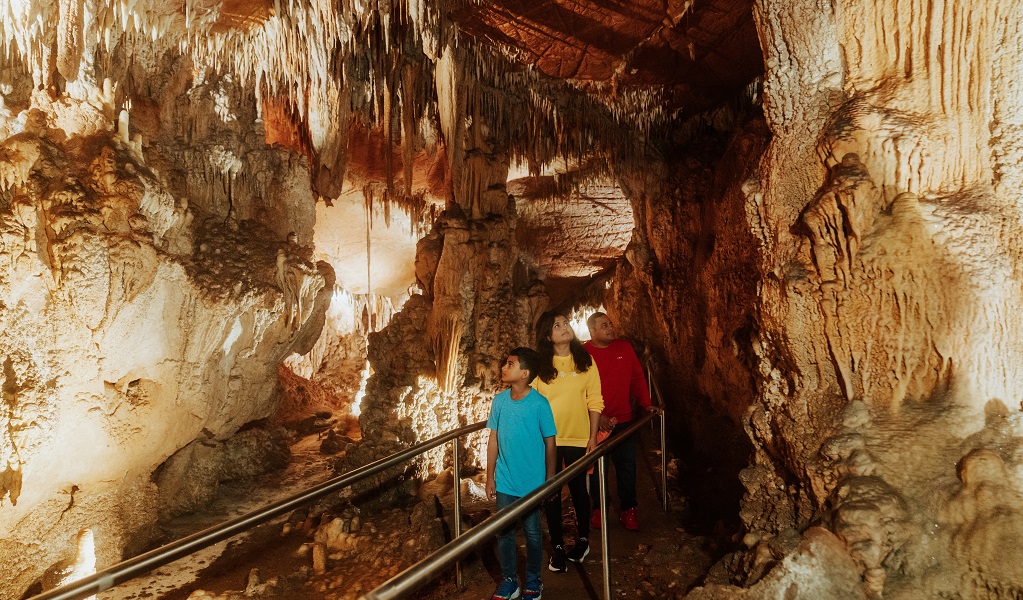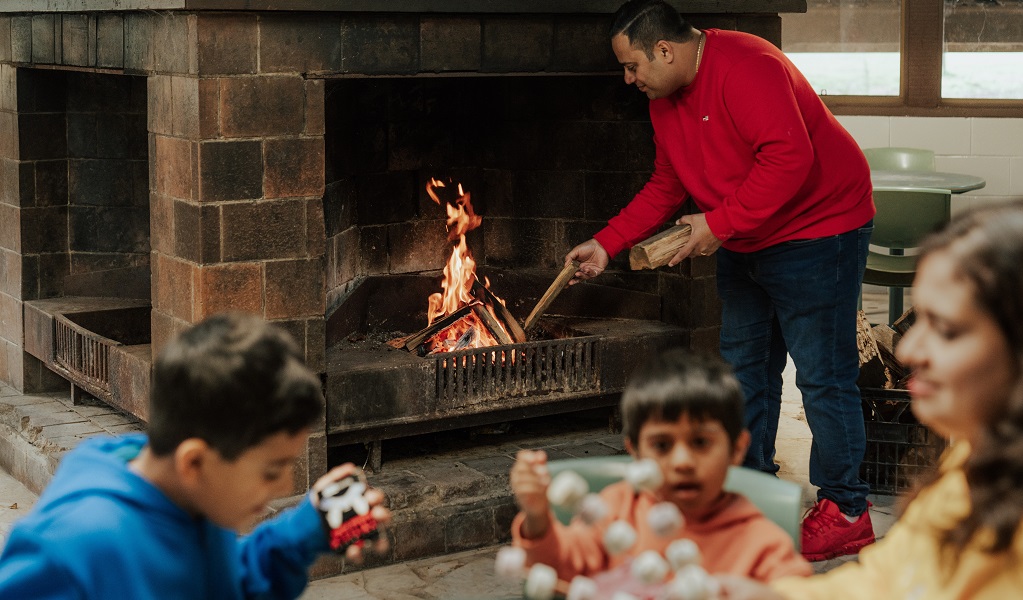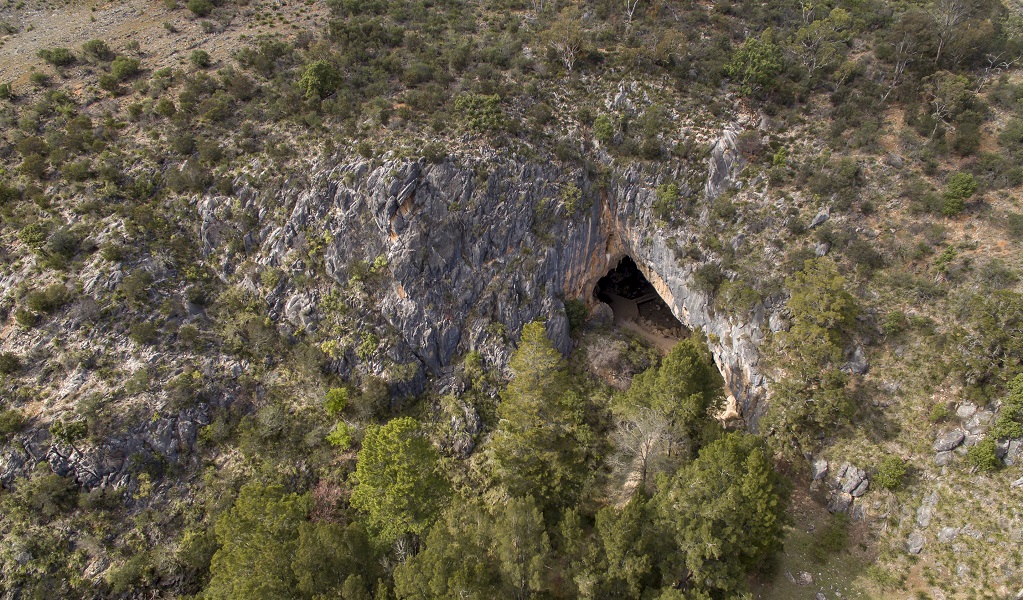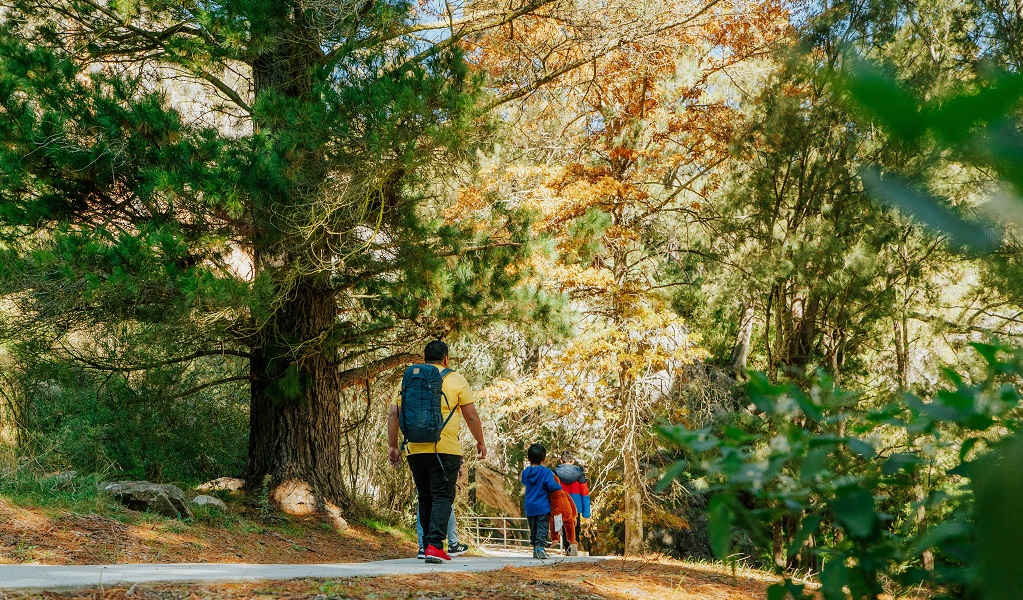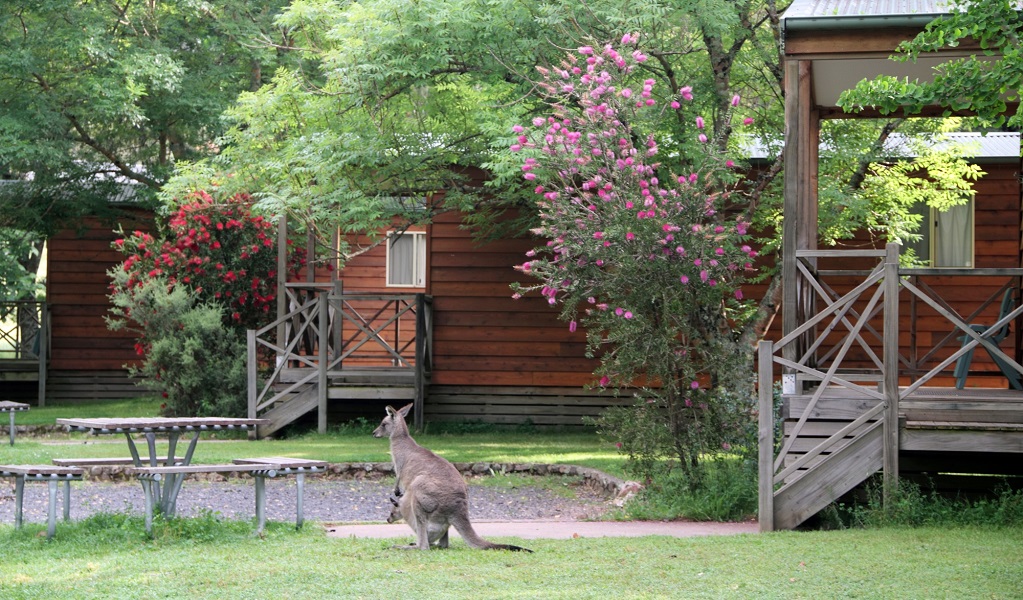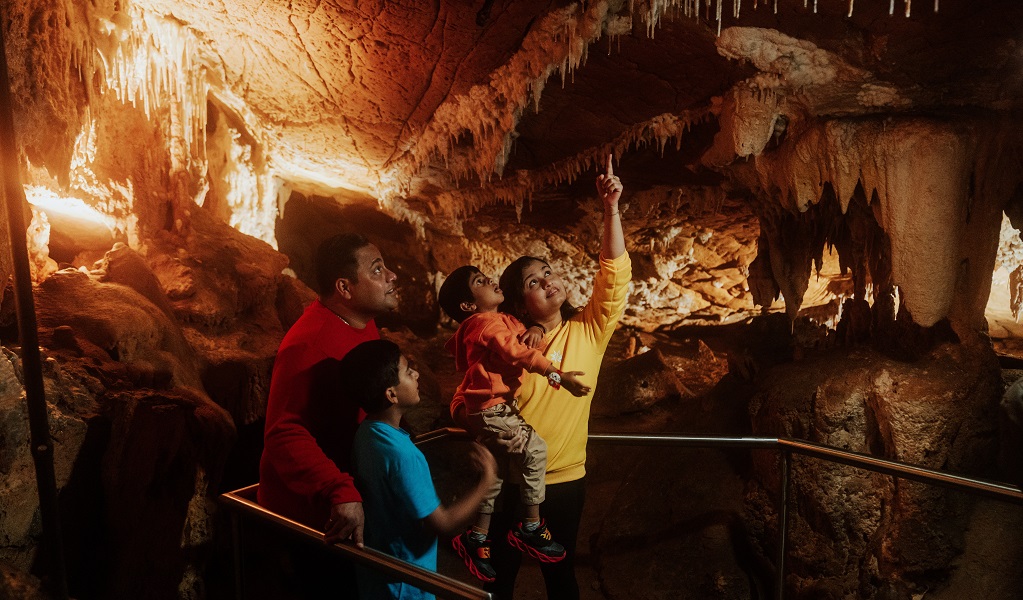Wombeyan Karst Conservation Reserve
Open, check current alerts
Overview
Stay and cave at Wombeyan Karst Conservation Reserve. With guided tours, accessible walks and cosy cabins, it’s the perfect destination for a weekend nature getaway.
Read more about Wombeyan Karst Conservation Reserve
Enjoy show-stopping caves and welcoming visitor facilities at Wombeyan Karst Conservation Reserve. Explore the magical underground world of Wombeyan Caves by day on a guided or self-guided tour. Then, pitch a tent in the spacious campground or put your feet up in a comfortable cabin equipped with all the necessities. Bring some snacks to enjoy in the shady picnic area, where you might meet the inquisitive local kangaroos. And don’t miss the accessible walking track to Victoria Arch, one of Wombeyan’s most epic cave chambers.
An easy drive from Sydney, Canberra and Wollongong, the reserve is a great place for a family camping trip or weekend retreat.
Enjoy a relaxing stay in nature
Explore the caves your way
Wombeyan is home to an impressive network of caves. There are 4 main show caves to choose from, each with their own unique features. Book a family-friendly tour or combo pass to explore this fascinating cave system.
More great reasons to visit
Plan your underground nature escape
Local alerts
For the latest updates on fires, closures and other alerts in this area, see https://www.nationalparks.nsw.gov.au/visit-a-park/parks/wombeyan-karst-conservation-reserve/local-alerts
Map
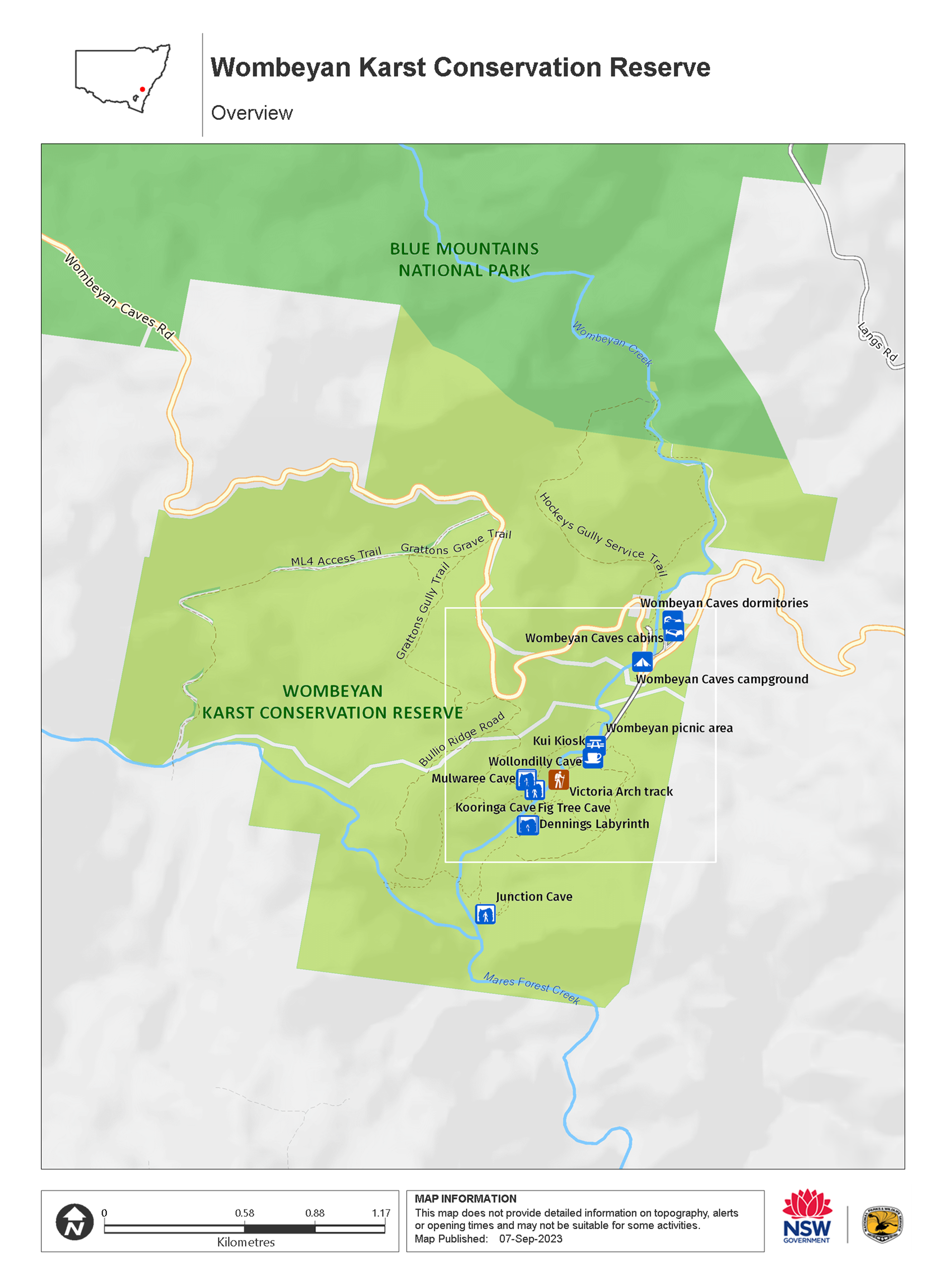
Map
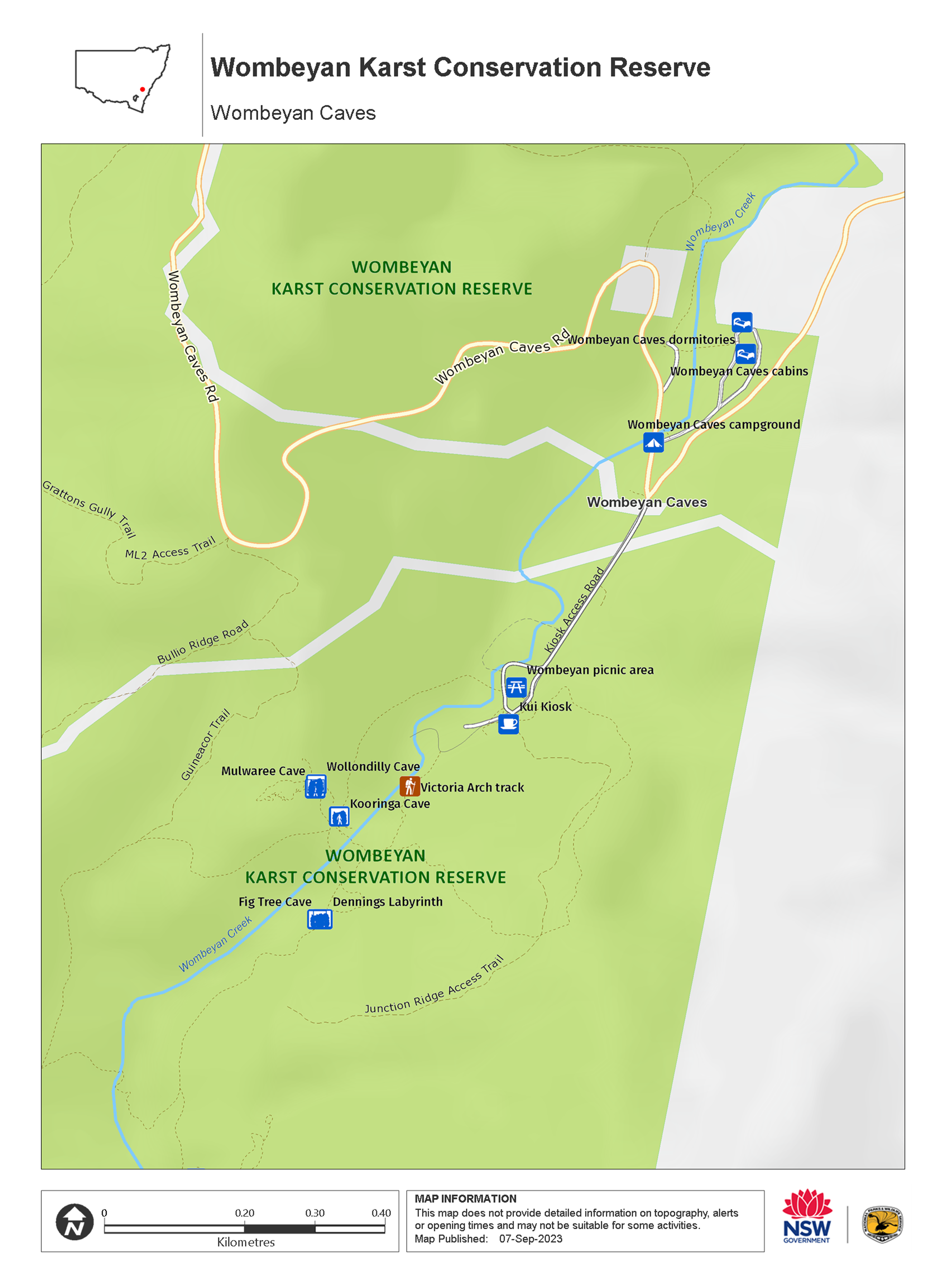
Map legend
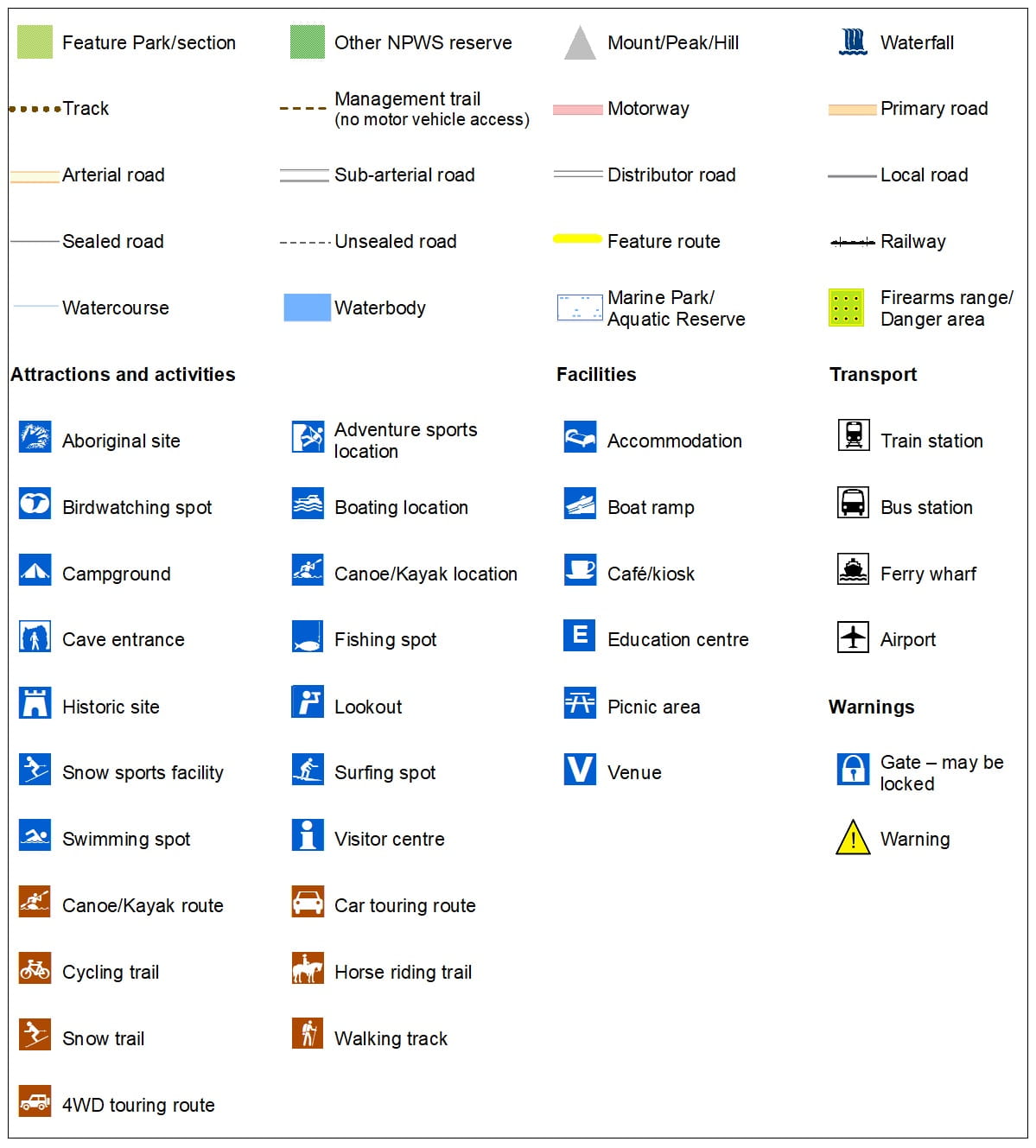
Contact
- in the Country NSW region
Wombeyan Karst Conservation Reserve is always open but may have to close at times due to poor weather or fire danger.
-
-
Wombeyan Caves office
02 4843 5976
Contact hours: 9am to 4.30pm daily. Closed Christmas Day. - 41 Victoria Arch Drive, Wombeyan Caves NSW 2580
-
Email: wombeyan.caves@environment.nsw.gov.au
-
Wombeyan Caves office
-
-
Oberon office
02 6336 6200
Contact hours: Monday to Friday, 9am to 4.30pm. - 38 Ross Street, Oberon NSW 2787
-
Email: npws.kanangra@environment.nsw.gov.au
-
Oberon office
Visitor info
All the practical information you need to know about Wombeyan Karst Conservation Reserve.
Getting there and parking
Get driving directions
You can only access Wombeyan Karst Conservation Reserve via Taralga and Wombeyan Caves Road. To get there:
From Sydney via Goulburn (3hr drive):
- Take the South Western Motorway to Goulburn
- From Goulburn, follow Tablelands Way through Taralga
- Take the Wombeyan Caves Road turnoff and drive for 23km (sealed and unsealed road).
From Sydney via Oberon (4hr drive):
- Take the M4 and Great Western Highway towards Lithgow
- Turn left onto Jenolan Caves Road, then after 23km turn right onto Duckmaloi Road
- From Oberon, follow Tablelands Way
- Take the Wombeyan Caves Road turnoff and drive for 23km (sealed and unsealed road).
From Canberra (2.5hr drive):
- Take the Federal Highway to Goulburn, then take Goulburn-Taralga-Oberon Road towards Taralga for about 45km
- Continue through Taralga for 10km until you reach the Wombeyan Caves turnoff
- Turn right onto Wombeyan Caves Road and drive for 23km (sealed and unsealed road).
From Wollongong (3hr drive):
- Take the Princes Highway towards Sydney
- Turn off at the Picton Road exit and follow for around 27km, then take the Hume Highway towards Goulburn
- From Goulburn, follow Tablelands Way through Taralga
- Take the Wombeyan Caves Road turnoff and drive for 23km (sealed and unsealed road).
Wombeyan Caves Road access via Mittagong is closed until further notice.
Refuel your vehicle on the way, as there is no petrol station at Wombeyan Karst Conservation Reserve.
Parking
- Accessible parking at Kui Kiosk See on map
- Wombeyan picnic area See on map
Road quality
- Mixture of sealed and unsealed roads
Vehicle access
- 2WD vehicles (no long vehicle access)
By bike
Check out the Bicycle information for NSW website for more information.
By public transport
For information about public transport options, visit the NSW country transport info website
Best times to visit
There are lots of great things waiting for you in Wombeyan Karst Conservation Reserve. Here are some of the highlights.
Autumn
Visit now and you'll see the gorgeous changing colours of the trees. The warm days and cool nights make this an ideaI time for camping.
Spring
While the caves can be visited all year round, a trip to Wombeyan in spring is well timed to catch wildflowers in full bloom.
Summer
A great time for a weekend camping trip - pitch your tent, enjoy breakfast cooked on the barbecue and the coolness of the caves on a guided tour.
Winter
Take advantage of the cooler weather and book a weekend getaway at Wombeyan Caves cabins.
Weather, temperature and rainfall
Summer temperature
Average
13°C and 26°C
Highest recorded
38.8°C
Winter temperature
Average
1°C and 11°C
Lowest recorded
-9.6°C
Rainfall
Wettest month
June
Driest month
April
The area’s highest recorded rainfall in one day
174.2mm
Facilities
Amenities
Toilets
Showers
Picnic tables
Barbecue facilities
Drinking water
Public phone Show more
- Fig Tree Cave
- Junction Cave
- Kooringa Cave
- Kui Kiosk
- Mulwaree Cave
- Victoria Arch walking track
- Wollondilly Cave
- Wombeyan Caves cabins
- Wombeyan Caves campground
- Wombeyan Caves dormitories
- Wombeyan picnic area
Electric power
Maps and downloads
Prohibited
Drones
Flying a drone for recreational purposes is prohibited in this area. Drones may affect public enjoyment, safety and privacy, interfere with park operations, or pose a threat to wildlife. See the Drones in Parks policy.
This area may be a declared Drone Exclusion Zone, or may be subject to Civil Aviation Safety Authority (CASA) rules for flying near airports, aerodromes and helicopter landing sites. See CASA's Drone Flyer Rules.
Commercial filming and photography
Commercial filming or photography is prohibited without prior consent. You must apply for permission and contact the local office.
Gathering firewood
Firewood may not be collected from the park, so you'll need to bring your own supply.
Pets
Pets and domestic animals (other than certified assistance animals) are not permitted. Find out which regional parks allow dog walking and see the pets in parks policy for more information.
Smoking
NSW national parks are no smoking areas.
Nearby towns
Taralga (26 km)
Many of Taralga's existing buildings date from the 1860s to the 1890s, and most of them consist of stone from local volcanic supplies. This has resulted in an architectural style unique to Taralga that is somewhere between Georgian and Victorian, giving the town a unique and picturesque aesthetic.
Crookwell (64 km)
Situated high on the Great Dividing Range more than 900 m above sea level, the area experiences four distinct seasons and is ideal for growing disease-free seed potatoes, making it a key supply area to Australia's potato-growing regions. Every March, the region celebrates the industry with the Crookwell Potato Festival.
Goulburn (72 km)
Named after Henry Goulburn - the British Secretary of State for the Colonies, Goulburn developed into a major centre for wool, and in 1863, it became Australia's first inland city. Today, the town is a rich hub of history, discovery and natural beauty.
Learn more
Wombeyan Karst Conservation Reserve is a special place. Here are just some of the reasons why:
On show

The limestone in the caves of Wombeyan Karst Conservation Reserve is 430 million years old. The geological processes that have created the magnificent cave system you see today continue to work their magic. You'll notice the impressive cave decorations, including stalactites and stalagmites, that are created by the infiltration of water into the caves. Take a guided cave tour to find out more about the history and geology of the caves.
- Fig Tree Cave Be sure to take a family-friendly, self-guided tour through the impressive Fig Tree Cave while you’re at Wombeyan Karst Conservation Reserve. It’s widely regarded as one of NSW’s best self-guided cave experiences.
- Kooringa Cave The ornately decorated Kooringa Cave in Wombeyan Karst Conservation Reserve is sure to impress. Bring your camera to capture striking columns and rippled draperies on a guided tour through this single-chamber cave.
- Mares Forest Creek walking track Following Mares Forest Creek, this unique walking track in Wombeyan Karst Conservation Reserve leads to the Tinted Cave. It's a 3.2km return walk.
- Mulwaree Cave Join a 1hr guided tour through the magnificent Mulwaree Cave in Wombeyan Karst Conservation Reserve. Inside this cave you’ll see shining decorations, large stalactites and spectacular colour variations on the walls.
- Victoria Arch walking track Victoria Arch walking track is a short, accessible walk in Wombeyan Karst Conservation Reserve. The easy bushwalk takes you to a viewing platform overlooking a remarkable natural rock formation.
Life in the air
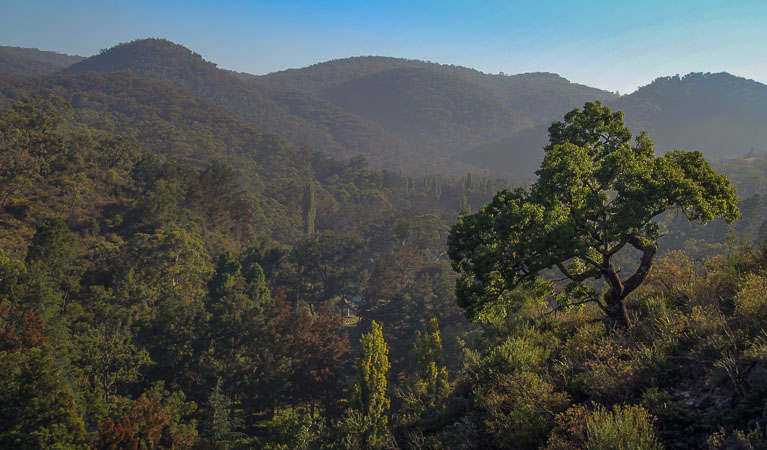
Wombeyan Karst Conservation Reserve plays a special role in the conservation of some of Australia's precious native flora and fauna. The moist forest that surrounds the park's creeks is home to superb lyrebirds, eastern whipbirds and flycatchers – look for lyrebird scratches on the forest floor. Around the park's rocky outcrops, see if you can spy birds of prey, including brown goshawks and wedge tailed eagles. You'll have to look particularly carefully to see a tawny frogmouth. Their camouflage is excellent – they stay very still and upright, and you might mistake them as part of the branch they're perched on.
- Mares Forest Creek walking track Following Mares Forest Creek, this unique walking track in Wombeyan Karst Conservation Reserve leads to the Tinted Cave. It's a 3.2km return walk.
- Victoria Arch walking track Victoria Arch walking track is a short, accessible walk in Wombeyan Karst Conservation Reserve. The easy bushwalk takes you to a viewing platform overlooking a remarkable natural rock formation.
Aboriginal connections

Wombeyan Karst Conservation Reserve is located within the traditional lands of the Gundungurra People, with the word Wombeyan coming from local language meaning 'Wombat' or 'home of the Wombat'. It's believed that Wombeyan Caves were part of an Aboriginal travel route, with the caves providing reliable shelter. The Dreamtime story of Gurangatch relates to the forming of Wombeyan and Jenolan caves. They are said to have been formed during a contest between 2 mythical beings, Gurangatch and Mirragang. Gurangatch was part fish and part reptile, and Mirragan was a legendary tiger cat.
Plants and animals protected in this park
Animals
-

Eastern bentwing-bat (Miniopterus schreibersii oceanensis)
Eastern bentwing-bats congregate in caves across the east and north-west coasts of Australia, in colonies of up to 150,000. These small Australian animals weigh around 13-17g and can reach speeds of up to 50km per hour. Eastern bentwing-bats use both sight and echolocation to catch small insects mid-air.
-

Bare-nosed wombat (Vombatus ursinus)
A large, squat marsupial, the Australian bare-nosed wombat is a burrowing mammal found in coastal forests and mountain ranges across NSW and Victoria. The only other remaining species of wombat in NSW, the endangered southern hairy-nosed wombat, was considered extinct until relatively recently.
-

Common brushtail possum (Trichosurus vulpecula)
One of the most widespread of Australian tree-dwelling marsupials, the common brushtail possum is found across most of NSW in woodlands, rainforests and urban areas. With strong claws, a prehensile tail and opposable digits, these native Australian animals are well-adapted for life amongst the trees.
-

Common ringtail possum (Pseudocheirus peregrinus)
Commonly found in forests, woodlands and leafy gardens across eastern NSW, the Australian ringtail possum is a tree-dwelling marsupial. With a powerful tail perfectly adapted to grasp objects, it forages in trees for eucalypt leaves, flowers and fruit.
Environments in this park
What we're doing
Wombeyan Karst Conservation Reserve has management strategies in place to protect and conserve the values of this park. View the detailed park and fire management documents. Here is just some of the work we’re doing to conserve these values:
Understanding landscapes and geology
Wombeyan Karst Conservation Reserve values the protection and conservation of biodiversity, land and native vegetation. Ongoing initiatives are carried out within this park, and are designed to deliver important landscape connectivity conservation outcomes.
Preserving biodiversity
Biodiversity is integral to Wombeyan Karst Conservation Reserve, and the reserve’s native flora and fauna communities – including threatened species – are carefully protected. Pest management and weed control programs are in place in this park and are implemented with minimal disturbance to the area’s special karst environment.
Managing weeds, pest animals and other threats
Pests and weeds have a significant impact to the ecosystems within Wombeyan Karst Conservation Reserve. NPWS carries out risk assesments for new and emerging weeds as well as wild dog control to protect biodiversity in this conservation reserve.
Developing visitor facilities and experiences
NPWS is committed to providing its visitors with clear, accurate information. The directional signage and interpretive material displayed in Wombeyan Karst Conservation Reserve is regularly reviewed, ensuring the public is aware of the unique requirements of visiting this delicate area. NPWS regularly maintains its visitor facilities, and management programs are ongoing in this reserve.
Conserving our Aboriginal culture
Wombeyan Karst Conservation Reserve ensures all Aboriginal sites within its borders are protected and preserved. NPWS collaborates with the Pejar Local Aboriginal Land Council on Aboriginal site management and interpretation, and sites are regularly inspected and maintained. Development decisions are made with the goal of minimal impact and least proximity to Aboriginal sites. Research into Aboriginal culture is ongoing in this park.
Managing fire
NSW is one of the most bushfire prone areas in the world as a result of our climate, weather systems, vegetation and the rugged terrain. NPWS is committed to maintaining natural and cultural heritage values and minimising the likelihood and impact of bushfires via a strategic program of fire research, fire planning, hazard reduction, highly trained rapid response firefighting crews and community alerts.
General enquiries
- National Parks Contact Centre
- 7am to 7pm daily
- 1300 072 757 (13000 PARKS) for the cost of a local call within Australia excluding mobiles
- parks.info@environment.nsw.gov.au
Contact
- in the Country NSW region
Wombeyan Karst Conservation Reserve is always open but may have to close at times due to poor weather or fire danger.
-
-
Wombeyan Caves office
02 4843 5976
Contact hours: 9am to 4.30pm daily. Closed Christmas Day. - 41 Victoria Arch Drive, Wombeyan Caves NSW 2580
-
Email: wombeyan.caves@environment.nsw.gov.au
-
Wombeyan Caves office
-
-
Oberon office
02 6336 6200
Contact hours: Monday to Friday, 9am to 4.30pm. - 38 Ross Street, Oberon NSW 2787
-
Email: npws.kanangra@environment.nsw.gov.au
-
Oberon office
In this park:
Things to do (19)
- Adventure sports (1)
- Birdwatching and wildlife encounters (3)
- Cafes and kiosks (1)
- Environmental appreciation/study (2)
- Other experiences (1)
- Picnics and barbecues (2)
- Show cave tours (7)
- Sightseeing (1)
- Swimming (1)
- Walking (5)
- Waterfalls (1)
